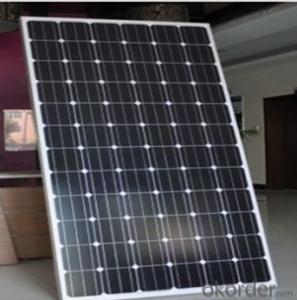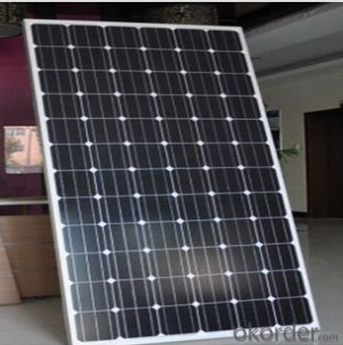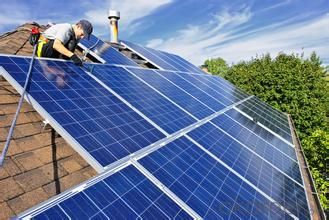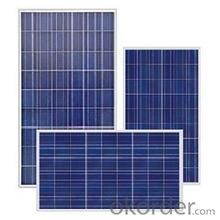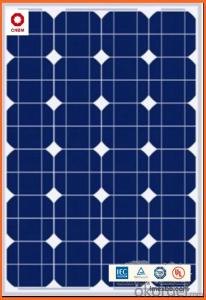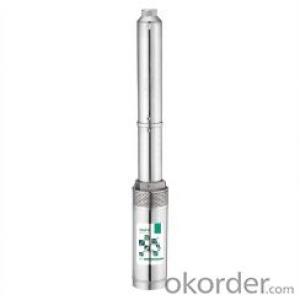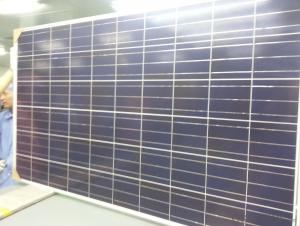Cheap Solar Energy Systems:45kw Solar Home Solution Approved by TUV UL CE
- Loading Port:
- Shanghai
- Payment Terms:
- TT OR LC
- Min Order Qty:
- 1 pc
- Supply Capability:
- 100 pc/month
OKorder Service Pledge
OKorder Financial Service
You Might Also Like
Specification
45KW Solar Home Solution Approved by TUV UL CE
Production description
PV array:
Convert sunlight instantly into DC electric power. Formed by the solar modules (also called photovoltaic
modules) in accordance with the system requirements for series and parallel.
Solar charge controller:
A charge controller may be used to power DC equipment with solar panels. The charge controller
provides a regulated DC output and stores excess energy in a battery as well as monitoring the battery
voltage to prevent over charge or over discharge. An inverter can be connected to the output of a charge
controller to drive AC loads.
Inverter:
Converts DC output power of photovaltaic soalr panels into standard AC power for use in the local off-grid
electrical network. It is a critical component in a photovoltaic system, allowing the use of ordinary
commercial appliances.
Battery banks:
Stores energy when there is an excess coming in and distribute it back out when there is a demand. Solar
PV panels continue to re-charge batteries each day to maintain battery charge.
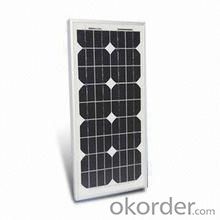
Feature
1.High conversion efficiencies resulting in superior power output performance.
2.Outstanding power output even in low light or high temperature conditions
3.Optimized design for ease of soldering and lamination
4.Long-term stability,reliability and performance
5.Low breakage rate
6.Color uniformaity
Physical characteristic
1. Rigorous quality control meets the highest international standards.
2. High-transmissivity low-iron tempered glass, strong aluminium frame.
3. Using UV-resistant silicon.
4. IS09001/14001/CE/TUV/UL
- Q: Are there any disadvantages of solar energy systems?
- While solar energy systems have numerous advantages, they also come with a few disadvantages. One of the main drawbacks is the high initial cost of installation. The upfront expenses associated with purchasing and installing solar panels can be quite substantial, making it unaffordable for some individuals or businesses. Additionally, the efficiency of solar panels is affected by external factors such as weather conditions, shading, and the angle of the panels, which can limit their effectiveness in certain locations. Another disadvantage is the intermittent nature of solar power, as it can only be generated during daylight hours and is not available during cloudy or nighttime conditions. This requires the installation of expensive battery systems for energy storage or reliance on the grid during non-generating periods. Lastly, the production of solar panels requires the use of certain materials, some of which are non-renewable and may have negative environmental impacts during extraction and manufacturing processes. Despite these disadvantages, advancements in technology and decreasing costs are continually improving the efficiency and affordability of solar energy systems.
- Q: Can solar energy systems be used in powering electric fences or security systems?
- Yes, solar energy systems can be used to power electric fences or security systems. Solar panels can convert sunlight into electricity, which can then be stored in batteries and used to power these systems. This provides a reliable and sustainable source of energy, especially in remote areas where access to conventional power sources may be limited. Additionally, solar-powered systems are cost-effective and environmentally friendly, making them an ideal choice for powering electric fences and security systems.
- Q: Can solar energy systems be installed on flat surfaces?
- Yes, solar energy systems can be installed on flat surfaces. While it is more common to install solar panels on angled surfaces to maximize sunlight absorption, flat surfaces can still be utilized for solar energy systems. Mounting systems can be used to tilt the panels towards the sun and optimize energy production even on flat surfaces.
- Q: What is the expected return on investment for a solar energy system?
- The return on investment (ROI) for a solar energy system can vary based on several factors, such as the initial cost, location, available incentives, and energy usage. Typically, solar energy systems are expected to yield a positive ROI over their lifespan. Installing a solar energy system involves a significant upfront investment, including expenses for solar panels, inverters, and installation. However, the decreasing costs of solar technology in recent years have made the initial expense more affordable. The location of the solar energy system is crucial in determining the expected ROI. Areas with higher solar irradiance and longer sunshine hours tend to generate more electricity, resulting in a higher ROI. Additionally, net metering policies that allow excess electricity to be credited back to the owner can further boost the ROI. Government incentives and subsidies can have a significant impact on the expected ROI. Many countries provide tax credits, grants, and rebates to promote the adoption of solar energy systems. These incentives reduce the initial cost and expedite the payback period, thus enhancing the overall ROI. Furthermore, the energy usage of the property plays a critical role in determining the expected ROI. Higher electricity consumption offers more opportunities for the solar energy system to offset utility bills, resulting in greater savings and an improved ROI. While the specific ROI can vary, studies indicate that solar energy systems typically recoup their costs within 5 to 10 years and continue to generate free electricity for several decades. This extensive period of energy production allows for substantial savings on utility bills and a positive ROI over the system's lifetime. In summary, investing in a solar energy system can provide long-term financial benefits, including reduced electricity costs, potential revenue from excess electricity generation, and increased property value. Conducting a comprehensive evaluation considering the aforementioned factors is crucial in determining the expected ROI for a solar energy system in a specific scenario.
- Q: How do solar energy systems impact the stability of the electricity supply?
- Solar energy systems can have a positive impact on the stability of the electricity supply by diversifying the energy sources and reducing reliance on traditional power plants. The decentralized nature of solar energy generation reduces the risk of large-scale blackouts and enhances grid resilience. Additionally, solar power can help meet peak electricity demand during daylight hours, reducing strain on the grid and promoting a more stable and balanced electricity supply.
- Q: What is the role of solar energy systems in reducing reliance on fossil fuels?
- Solar energy systems play a crucial role in reducing reliance on fossil fuels by harnessing the power of the sun to generate clean and renewable electricity. By providing a sustainable alternative to fossil fuel-based energy sources, solar energy systems help to decrease greenhouse gas emissions and combat climate change. Additionally, solar energy systems offer a decentralized and distributed energy generation model, empowering individuals and communities to become energy self-sufficient and less reliant on centralized fossil fuel power plants.
- Q: How often do solar panels need to be cleaned?
- Solar panels generally need to be cleaned at least once or twice a year to ensure optimal performance. However, the frequency of cleaning can vary depending on factors such as the local climate, amount of dust or debris accumulation, and the tilt angle of the panels. Regular inspections and maintenance can help determine the specific cleaning needs of solar panels.
- Q: How do solar energy systems affect the installation of satellite dishes?
- Solar energy systems can potentially affect the installation of satellite dishes by obstructing the line of sight between the dish and the satellite. It is important to carefully plan and position both the solar panels and satellite dish to ensure they do not interfere with each other.
- Q: How do solar energy systems impact the efficiency of air conditioning systems?
- Solar energy systems can significantly impact the efficiency of air conditioning systems by providing a clean and renewable source of power. By harnessing solar energy, air conditioning units can operate without relying solely on grid electricity, reducing their carbon footprint and energy costs. Additionally, solar-powered air conditioning systems can operate during peak demand periods when electricity rates are typically higher, further enhancing their efficiency.
- Q: Can solar energy systems be installed in areas with extreme weather conditions?
- Solar energy systems can indeed be installed in regions with harsh weather conditions. Though extreme heat, cold, wind, or snow may potentially affect the efficiency of solar energy systems, modern solar technology has been engineered to endure such conditions. Solar panels are constructed using sturdy materials capable of withstanding high temperatures, freezing temperatures, and strong winds. Furthermore, solar panels undergo rigorous testing and certification to meet industry standards for durability and performance in various weather conditions. In areas with extreme heat, solar panels are designed to dissipate heat and maintain optimal efficiency. They are thoroughly tested to ensure they can sustain high temperatures without any damage or significant performance loss. Similarly, solar panels in areas with extreme cold are built to withstand freezing temperatures and can even generate electricity in snowy conditions. Some solar panels feature anti-reflective coatings to absorb more sunlight and expedite snow melting. Moreover, solar energy systems are commonly installed with robust mounting systems and structures capable of enduring strong winds or storms. These systems are engineered to ensure that solar panels remain securely attached to roofs or ground mounts, even in hurricane-prone or high-wind regions. Though the performance of solar energy systems may be slightly affected by extreme weather conditions, proper installation and design enable solar panels to still generate electricity and provide a dependable source of renewable energy in such areas. It is advisable to seek guidance from experienced solar installers or engineers who can evaluate the specific weather conditions of a given region and develop a solar energy system capable of withstanding those conditions.
Send your message to us
Cheap Solar Energy Systems:45kw Solar Home Solution Approved by TUV UL CE
- Loading Port:
- Shanghai
- Payment Terms:
- TT OR LC
- Min Order Qty:
- 1 pc
- Supply Capability:
- 100 pc/month
OKorder Service Pledge
OKorder Financial Service
Similar products
Hot products
Hot Searches
Related keywords
